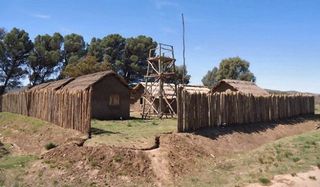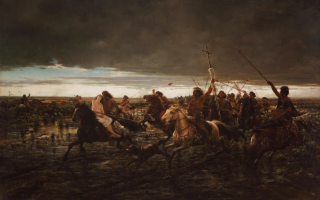 MILONGA DE LOS FORTINES
MILONGA DE LOS FORTINES
(Milonga of the forts)
Milonga, 1937
Words: Homero Manzi
Music: Sebastian Piana
Milonga tangueada, 1937
Every so often you hear that milonga that begins and ends with a bugle call, right? And it's really fun to dance to, isn't it? (Orquesta Típica Victor w/ Mariano Balcarce, 1937) The singer only sings one short verse, so even if you understand Spanish it's really hard to catch what the song is about. As a result, you go home wondering why they were blowing that crazy bugle! Well, here are all four stanzas in black and white, in the original Spanish and Tango Decoder's English-language version. Read on! The bugle, and everything else in the song, will start to make sense....
THE HISTORICAL CONTEXT

Ángel della Valle, "La vuelta del malón" (Return of the Raiders, 1892)
So what's it all about, this little milonguita? What are the fortines of the title? Why the bugle? Well, back in the mid-1800s the criollos, the Argentine settlers of European ancestry, came into conflict with the Mapuche, a widely dispersed group of native people who, as the Europeans saw it, were standing in the way of progress, not unlike the Comanche, the Apache, and the Sioux in North America. For their part, the Mapuche had been living on the pampa for four hundred years or so, and they weren't about to give up their traditional lifeways for a bunch of newcomers who wanted to raise cattle and grain. So, just like their counterparts in North America, the Mapuche fiercely resisted the incursion of the settlers. In this they were aided by neighboring Chile, which supplied arms, hoping the insurgency would destabilize Argentina, thus allowing Chile to annex more of Patagonia. Argentina's leaders sought a definitive solution to the problem. Thus was born "The Conquest of the Desert," a ruthless program of displacement and extermination of the aboriginal people carried out by a succession of Argentine regimes.
The Conquest involved building a cordon of small fortresses, or fortines, around the more settled areas to defend against the attacking Mapuche. The boundaries of the cordon were expanded little by little over time. It took some years, but this plan eventually achieved its end: extermination for the most troublesome elements, and relocation and assimilation for the rest, leaving vast expanses of the pampa free to be exploited by the settlers. (There's a lot more to the story, but that's all you really need to place the song in its context.)
Milonga De Los Fortines does not deal with the Conquest of the Desert, per se. Rather, it's an evocative, nostalgic song about serving the Argentine army during that period, and being stationed at one of the fortines. What was it like out there in the vast, empty desert? What did a soldier see, hear, think, and feel? And most important of all, what kind of music did he listen to?
THE LYRICIST AND THE COMPOSER
Homero Manzi (1907-1951) was one of tango's greatest poets and lyricists. Manzi was the author of many of the best known tangos that are heard today, including Abandono, Solamente Ella, Mañana Zarpa Un Barco, Ninguna, Recién, Sur, and many more. In 1930 he began a collaboration with composer Sebastian Piana (1903-1994) with the intention of reviving and modernizing the milonga, a genre of music and dance that had been very popular in Argentina in the 1870s, but had virtually disappeared. Together, Piana and Manzi composed the seminal, modern milongas, Milonga Sentimental, Milonga de 900, and Milonga Triste. They also wrote several extraordinary tangos together, including El Pescante, De Barro, and Viejo Ciego, as well as one of the most beautiful valses ever written, Paisaje.
THE LYRICS IN SPANISH AND ENGLISH:
|
Milonga de cien reyertas
templada como el valor.
Grito de pampa desierta
diciendo su alerta
con voz de cantor.
Milonga de quita penas
nostalgia de población.
Canto qu'en noche serena
su rezo despena detrás del fogón.
Diana de viejas victorias
en la punta del tropel,
con tu vanguardia de gloria
serás en la historia
canción y laurel.
Son de querencia querida
en las noches del cuartel.
Pena de china querida
que al fin afligida
dejó de ser fiel.
Resuenan con tus acentos,
milonga del batallón,
gritos de viejos sargentos
cargando en el viento
con el escuadrón.
Y vuelven en los sonidos
agudos del cornetín,
ecos de mil alaridos
que estaban perdidos
detrás del confín.
Gime el desierto rodando
sus rumores de huracán...
Vienen las lanzas cargando
y están aguaitando
la Cruz y el Puñal.
Gloria de aquel comandante
que jamás volvió al cantón.
Besan su barba cervuna
la luz de la luna
y el fuego del sol.
|
Milonga of a hundred battles,
calm as courage itself.
Cry of deserted pampa
raising the alarm
in a singer's voice.
Milonga of banish sorrows*
longing for hearth and home.
Song that in the peaceful night
consoles with fireside prayer.
Bugle call of victories past
at the forefront of the horde,
with your glorious vanguard
you will in history
be celebrated and sung.
Sound of sweet love-making
in the barracks night.
Sorrow of the china mistress*
who heartbroken at last
stopped being faithful.
They resound with your accents,
milonga of the battalion,
the cries of old sergeants
charging into the wind
with the squadron.
And they return in the
sharp sounds of the bugle,
echoes of a thousand battle cries
that were lost
behind the lines.
The desert goes on moaning
its rumors of hurricane...
The lancers come charging
fixing their eyes upon
The Cross and The Dagger.*
Glory of that commandant
that never returned to camp.
The light of the moon
and the fire of the sun
kiss his snow-white beard.*
|
NOTES:
* banish sorrows: quita penas. Presumably a reference to an alcoholic beverage or an establishment where such beverages were served. In contemporary Chile, it's said that every town in the country has a bar across the street from the cemetery, and most of them are named "Quita Penas." The Quita Penas in Santiago is over 100 years old, so the tradition is a long one.
* china mistress: china querida. China was a derogatory term for a female gaucho, a person of mixed European and indigenous origin. Since no regular work was available for such women, unmarried chinas frequently resorted to prostitution, typically plying their trade among the officers and men of military barracks. Others may have established common-law marriages with soldiers whom they followed from camp to camp, in which case they might more accurately be referred to as "camp followers." Whether fairly or unfairly, the term china is often taken to be a synonym for "prostitute."
* lancers... Cross and the Dagger: When I first published this version of the song, I speculated that the "lancers" were the Argentine forces, and the Cross and the Dagger were devices on the regimental banner that they followed into battle. However, a more convincing interpretation of this phrase was provided in a comment by Thomas Keenes. (Thank you, Thomas!) It's still in the comments below, but I've copied it here:
"(Revised 7/13/2016)
* snow-white beard. barba cervuna. Cervuna means deer. The term also denotes the color of a horse that is between gray and chestnut (i.e., tan). The Pampas deer (Ozotoceros bezoarticus) that were once numerous in Brazil, Argentina, Uruguay, and Paraguay are tan-colored, and have a white spot under their chin that looks like a white beard. The dead commandant's beard might be tan ("deer-colored"), or it might be snow-white like the Pampas deer's. I favor the latter interpretation. (Revised 7/13/2016)


























